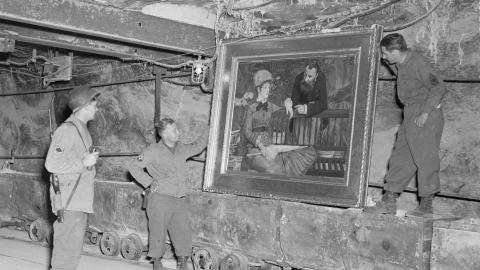David Cameron: Biography
David Cameron is the London born, Eton educated, Prime Minister and MP for Witney who believes he’s the handyman to fix UK PLC and sort out ‘broken Britain’. But is there more to this progressive, caring Conservative than his Thatcher-lite, Blair-like image? There was a time, before Iraq, when Britain was booming, that admitting to being a ‘nice but dim Tim Tory’ card-carrying member of the ‘Nasty Party’ was social suicide. So meet the man who remade the Conservative Party a political force ready to take national power.
About a boy
Perhaps the most admirable characteristic of this father of three is that he refrained from making political capital out of his most painful personal experience. His eldest son, Ivan, suffered from cerebral palsy which meant David experienced first-hand both the best and the worst of the NHS. Since Ivan’s death, aged just six, David has commented on the shortfalls in the system but with a remarkable restraint and it’s this commitment to the NHS which has differentiated him from previous Conservatives and made him acceptable to many swing voters. (When columnist Peter Hitchens read how stoically David dealt with Ivan, he publicly apologised for his earlier comments that David had never been tested.)
This is no ordinary life
David Cameron was born Conservative. Not only has he connections to royalty, but there are three conspicuous Conservative MPs in the family tree. His disabled stockbroker father welcomed in the future fourth one in October 1966. David spent his first three years in Kensington and Chelsea before moving to Berkshire. His childhood featured a nanny and a swimming pool, and his education was prep school, Eton and then Oxford. He’d spent his gap year before university working for a Sussex MP, and a shipping agent in Hong Kong, returning from there by rail through Eastern Europe.
David’s Oxford tutor for Philosophy, Politics and Economics remembers him as politically moderate but critics seize on his time in the notorious Bullingdon club. His membership of this exclusive clique, where wealth is prerequisite and excess is characteristic, is seen by some as proof that he was a hardcore, right wing, free-market Thatcherite disciple. That embarrassing and infamous photo of him with, amongst others, Boris Johnson, now London Mayor, must be seen in context. The 80s were a decade where the Left Wing of politics virtually vanished and, more importantly, how many present day professionals would include their student photos in their CV? He has understandably remained quiet over claims he smoked cannabis (or took cocaine), citing the right to a private life before he entered politics.
In 1988, he left Oxford with a First and secured a research job with the Conservative Party. He progressed to special adviser for the Treasury and then Home Office finding he had a particular affinity for preparing ministers for media appearances. But Cameron wasn’t always successful. He allowed his Chancellor boss, Norman Lamont, to respond ‘Je ne regrette rien’ to an economic question post the billion pound blunder that was Black Wednesday. Lamont mangled the pronunciation and came across as doubly incompetent. Cameron also wrote him a storming speech that, due to technical reasons, went disastrously. Cameron learnt from these two lessons. Firstly, the media message is everything, and secondly, never, ever rely on a script. Cameron’s later apparently off-cuff speeches would be the making of him. And while Cameron’s backroom ascent was anything but assured, he always showed relentless energy.
Having found his vocation, in 1993 he then met the love of his life, the tattoo sporting, trip-hop Tricky friend, and a baronet’s daughter, Samantha Sheffield. She’d been raised on an estate, a 300 acre one, and boasted a bloodline that rivalled his. David wanted marriage immediately. She agreed in 1996.
Samantha’s step father had ministerial responsibility for broadcasting, and both he and her mother were helpful when David decided to gain business experience as a spin doctor for a big UK media company, Carlton Communications, which had the ITV franchise. Inevitably, many journalists don’t remember his time there with fondness but his boss, TV tycoon Michael Green, thought him a shrewd operator and offered him a career. But after seven years there, and with enough world experience to deflect criticism that he was merely a career politician, David decided it was time to return to the fray.
Rise without a trace
Unfortunately for David, he returned to politics just as the country turned red. He lost his North Birmingham Stafford ‘safe’ seat in the 1997 New Labour bloodbath. What his Party and leaders did next was to make many (William Hague), many, (Ian Duncan Smith), many (Michael Howard) mistakes. The only consolation for Cameron during these wilderness years was that it was a textbook of how not to do it. His Party would endure two more election defeats, in 2001 and 2005, before they were ready to look for salvation in an unexpected corner.
In June 2001, he became MP for the Witney, an Oxfordshire market town. Over the following years, he occupied a number of shadow jobs, from finance to education, and it was during his time as policy co-ordinator that he almost imperceptibly began the Party’s shift to the centre.
But his ascent to leadership was inauspicious. He himself said he could have got his supporters in the back of a London taxi with a bit of room to spare. However, he had learnt from Lamont’s speech misfortune and he addressed the Party conference without notes. It propelled him from underdog to front-runner and just five years after being elected an MP, he was elected leader of the Opposition in December 2005.
But throughout August and September 2007, it looked like his brief stay at the top could end if Brown capitalised on soaring ratings. Cameron responded by addressing his troops at the Party conference without the armour of an autocue. Brown blinked. Cameron capitalised on the indecision, swiftly circulating the message that Brown had ‘bottled’ it.
Cameron relentlessly held onto the lead he thus secured. He will now not even allow a Party member to drink champagne for fear that cameras will capture it and suggest his chaps are comfortable in their success.
Back to the future
There is a contradiction in Cameron. He represents exactly the uncaring, moneyed classes that were rejected by voters as unrepresentative over three elections, and yet, it is Cameron that has repositioned himself as an everyman (by chatting away on ‘Mumsnet’ and ‘Webcameron’), and his Party as drawn from the electorate (by increasing ethnic and female candidates). He’s in sharp contrast to previous leaders like Heath, Thatcher and Major, who boasted ordinary backgrounds as their pedigree. David Cameron hopes to lead the UK as a Conservative PM, the likes of which have not been seen Harold Macmillan and his Etonian cabinet in the early 60s. But Cameron’s media expertise means that even if he fails to present himself as classless, he has succeeded in presenting himself as not of his class. Not surprisingly, establishing the core beliefs of this chameleon is not easy.
His Conservative bio page spouts the usual meaningless slogans common to all politicians. For example, he believes there is a need for change in times of recession and for cutting red tape, as if anyone promoted staying stagnant and stifling bureaucracy. There’s the usual dogmatic Conservative belief in the reduction of taxes which many believe the practicalities of recession will erode.
Sorry's not the hardest word
What is known is that while he may be predictably right wing on the economy, he’s unusually liberal on drugs and gays, at least for a Conservative leader. He’s said sorry for Section 28, the Tory legislation that banned promotion of homosexuality in schools. And he hasn’t stopped there. He’s said sorry for:
• Imposing the Poll Tax on the Scots first
• Thatcher’s ‘no such thing as society’
• Her calling Nelson Mandela’s ANC a terrorist organisation.
• Criticising the estate from which Karen Mathews came (the shameless mother who conspired in kidnap of her daughter for publicity and profit)
• Not realising the recession was coming (but that was more of a political manoeuvre to embarrass the PM Brown for his time as Chancellor.)
• His mild swearing on radio
• Minor factual inaccuracies over Muslim school funding
• Imitating a Tony Blair hand gesture when being interviewed by Jonathan Ross.
Some may see all of the above as meaningless utterances designed simply to win votes but he was genuinely risking opprobrium from the right of his Party for some of the above. For there are many hardliners, such as Lord Tebbit, waiting for him to make a mistake and restore their Party to the right.
Goodbye and thanks for cleaning the moat
Cameron emerged remarkably unscathed from the MPs’ expenses scandal, having only to repay for, among other things, claiming for the clearing of wisteria from the chimney of one of his homes. Many ask why he needs to claim anything considering it’s claimed the Camerons are worth £30m. This widely circulated figure is inaccurate in that it refers to their wider family wealth. But even if this is so, it again highlights the almost inconceivable moneyed world which he considers normal.
But that is not what the media focused on. Instead, they went for the aristocratic country house owning, moat cleaning, old guard of the Tories (as well, of course, as the greedy New Labour MPs.) It’s been suggested that Cameron, ever the Machiavellian, actually used the bad news story of MPs expenses to bury many of his ‘greyer’ political rivals who resisted his modernising efforts.
If anything, it has been his financial allies, such as the billionaire from Belize, the million pound donor to the Conservative Party, that have caused the most economic embarrassment to Cameron. The non domicile Lord has, quite legally, avoided paying millions in taxes. Not really what Cameron meant when he stated the Conservatives were still a party of low taxes.
Europe, what Europe?
The red in tooth and claw rivalries of whether to join in or to jettison Europe helped make the Conservatives unelectable. It’s this threat that history will repeat itself that has helped Cameron unite his factions. A federal Europe of one currency may be friend or foe, but it is an academic enemy as long as there remains the real and present danger of yet another New Labour government.
But the emerging superpowers of China and India threaten the US hegemony under which the UK enjoyed a superficial splendid isolation. Despite this, Cameron has taken the calculated risk of distancing himself from his natural allies in Europe, the centre right politics of German Chancellor Angela Merkl and French President Nicolas Sarkozy. Personally, Cameron has always been as Euro sceptic as Thatcher and politically, this move plays well with his rank and file. His adversity to economic union with Europe was undoubtedly informed by his professional experience of seeing his then boss, Norman Lamont, and his country’s currency, humiliatingly withdrawn from the European Exchange on 1992s Black Wednesday at a cost of over three billion pounds. (And before the Credit Crunch, that was considered a lot of money)
Cameron has said that he won’t abandon the EU, but he certainly won’t adopt the Euro. He will try to repatriate some of the social policy appropriated by Europe and his fundamental opposition to the centralisation inherent in the Lisbon Treaty will cause external conflict with amongst others, France and Germany. It has also resulted in some very odd new extremist allies in Europe who are diametrically opposed to his socially liberal viewpoint. (The Latvian Fatherland and Freedom Party is one, and as their name suggests, they are not renowned for their ethnically tolerant views.) But for now, his achievement is in reconciling the conflicting interests within his own Party and turning them from laughing stock to leading in the polls.
And the winner is...
Airbrushed posters of Cameron campaign posters saying ‘We can’t go on like this’ were similarly retouched by the public with satirical slogans added. Interestingly, for a medium noted for its bile, the majority of online contributions have a warm humour, showing affection rather than aversion. David Cameron says on his website that his greatest achievement is ‘getting the Conservative Party listened to again’. The former spin master may not always be in control of the message but there’s no doubting the fact that he’s redrawn the UK political scene around his own image.
First Term
In 2010, after 18 years absence, Cameron took the Conservatives back into power...sort of. His coalition, the first in over 50 years, with Nick Clegg and the Lib Dems has been an uneasy and sometimes unwieldy alliance.
Three years before the coalition government, Cameron had hired Andy Coulson, former editor of the now infamous tabloid News of the World, as director of his communications. As the phone hacking scandal built, Coulson was an early casualty in 2011. The resulting spotlight exposed a cosy elite of politicians, press and police. Cameron’s relationship with Rebekah Brooks, another former News of the World editor further damaged the Prime Minister. His embarrassing texts to her made front page news. Critics pointed out that the Prime Minister had hired and socialised with people later charged with perjury and phone hacking.
His veto in December 2012 on treaty changes in the European Union may have won him popular support, but it deeply irritated Clegg. Then again, Cameron had exactly the reverse effect with his promotion of gay marriage. Many, including liberals and homosexuals, were in disbelief that he expended so much political capital. But he did. And in February 2013, the Commons backed him.
In austerity Britain, however, it’s often economics, rather than politics that dominate. And here, despite the deficit, Cameron found himself as impotent as other politicians in dealing with everything from billion pound corporate tax avoiders to bankers’ bonuses.










